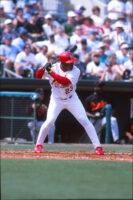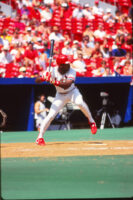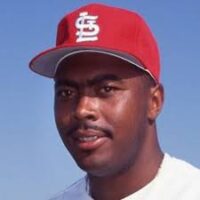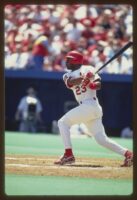Inductees
Bernard Gilkey
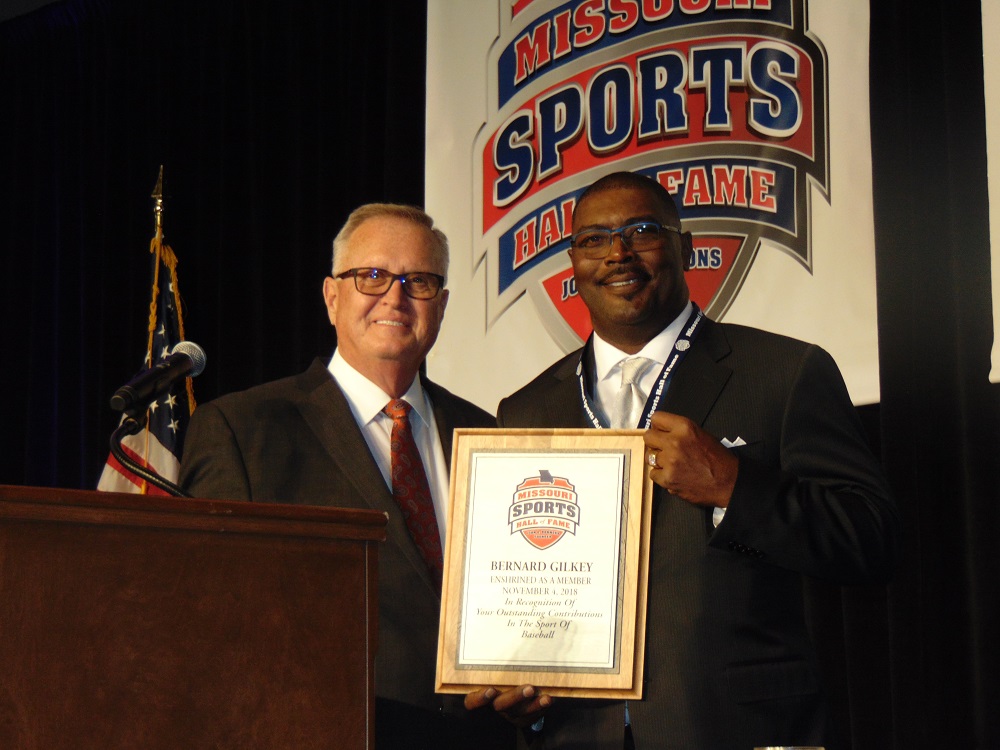
Born: September 24, 1966
The story goes that, in spring training 1989, the plan of then-St. Louis Cardinals farmhand Bernard Gilkey – to advocate for an opening day assignment with the club’s Double-A Texas League affiliate – just about backfired.
You see, newly installed farm director Ted Simmons “gave me the business,” Gilkey recalled, laughing of course.
Actually, it became a successful lobbying effort and, 18 months later, Gilkey was called up to the big leagues. Only, when he arrived to the clubhouse that September, his jersey wasn’t hanging at his locker. Instead, he was told to walk up to Simmons’ Busch Stadium office, where jersey No. 23 rested on his desk.
“He said, ‘Do you know who wore this number?” Gilkey said. “I said, ‘You did.’”
And so began a 12-year big-league career, which is why the Missouri Sports Hall of Fame proudly inducted Gilkey with the Class of 2018.
In many ways, his rise to the top seemed like a story written by a Hollywood script writer and, lo and behold, he later appeared in a Hollywood blockbuster, making a cameo in 1997’s “Men in Black” starring Will Smith.
After all, Gilkey … wasn’t a top baseball prospect at University City High School in St. Louis … wasn’t selected in the 1985 MLB Draft after his senior year … and thought he’d also play college baseball at Drake University (he had signed a basketball scholarship), only to be told Drake was axing its baseball program.
And yet Gilkey lived his dream. He spent his first six big-league seasons (1990 to 1995) for the Cardinals before playing for the New York Mets, Arizona Diamondbacks, Boston Red Sox and Atlanta Braves.
Overall, he hit 118 home runs, 244 doubles and had 546 RBI.
Two of his best years were in the mid-1990s. With St. Louis in 1995, he batted .298 with 17 home runs and 69 RBI. Traded the next season to the Mets, he belted 30 home runs, 44 doubles and had 117 RBI. In fact, he hit three homers and had 11 RBI in the opening weekend series vs. St. Louis.
And to think his career spring-boarded after meeting with Simmons in 1989.
It takes guts for any minor leaguer to request an opening day assignment, but especially for Gilkey at that time. He had repeated the high Class A Midwest League the year before and batted only .244.
Gilkey then rewarded Simmons and the Cardinals after they agreed to send him to Double-A Arkansas, as he and Lankford led the club to the Texas League pennant.
In the clinching game, despite playing with a severe quad injury, Gilkey scored the game’s only run after opening with a single, stealing second base and taking third on a wild throw to center, then advancing on a sacrifice fly.
The next season he hit .298 and reached the big leagues.
Looking back, two issues were at play when Gilkey approached Simmons. One, Gilkey wanted to remain teammates with Lankford, as their talents complimented one another. Secondly, it wasn’t as if Gilkey was a big-time prospect that the organization had heavily invested financially.
Understand, while Gilkey was All-State and All-Metro on University High School’s baseball program, many thought of him as a basketball player, since he had been a varsity starter since his sophomore season.
Thus, Gilkey was forced to prove his love for the game.
To get noticed in the summer of 1985, he joined the Joe Sotolar-sponsored Sotolar Pointers amateur baseball team, which traveled to the National Baseball Congress World Series in Wichita, Kan. Scouts from the Orioles and Reds approached Gilkey afterward, and soon the Cardinals swooped in.
“It didn’t take that much for me (to sign),” Gilkey said. “Being a Cardinals fan, that had plenty to do with it, and they gave me a shot at my dream.”
Years later, he still credits his older brother Steven and their dad for giving him his love for baseball.
“(Steven) was an exceptional ballplayer, and I always got to play with guys older than me,” Gilkey said. “Dad was a baseball coach. He always had equipment in his car. It was nothing for us to pull over and start up a baseball game.”
Gilkey, who later helped the 1999 Diamondbacks and 2001 Braves reach the playoffs, also credits his wife, Patrice for making his career. They are parents to Jaelen and Caeven.
“She was always supportive and wanted me to accomplish my goals,” Gilkey said. “She sacrificed a lot for me to get there.”
